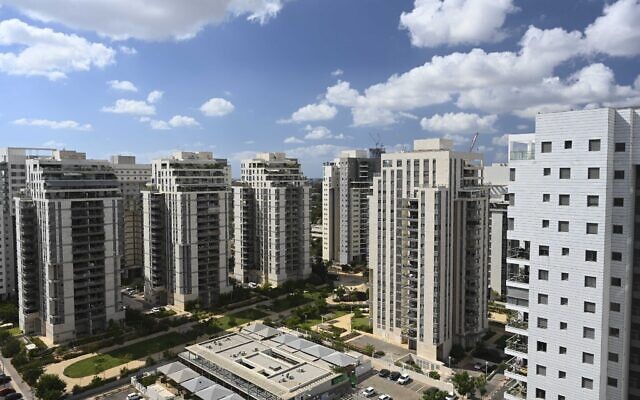Rise in housing prices slows but still up almost 19% from 2021
New CBS report shows prices up 18.8% in October to November 2022, a slight drop from previous period with record 20.3% rise

The persistent rise in housing prices over the course of 2022 slowed in November but home costs were still up close to 19% compared to the same period in 2021, according to new figures released Sunday by the Central Bureau of Statistics (CBS).
The newest housing report showed that housing prices rose by 18.8% on average in October-November 2022 compared to October-November 2021, and by a moderate 0.3% from September-October 2022.
This marked a slight drop from the previous monthly CBS report, which indicated that housing prices rose by a record 20.3% in September-October 2022, compared with the corresponding period in 2021. It was the largest year-on-year increase since May-June 2010, with a 20.4% rise on May-June 2009, according to CBS figures.
In October-November 2022, the highest price rises were seen in northern Israel, where prices were up 21.7%, followed by central Israel where housing prices increased by 21% on average from October-November 2021. Prices in southern Israel rose by just over 13% in the same period, according to the report. Jerusalem and Tel Aviv housing prices increased by 15.9% and 18%, respectively.
Overall, prices for new housing — dwellings not sold in the second-hand market or through subsidized housing programs — were up 22.4% in October-November 2022.
Israel’s housing market is characterized by high demand due to population growth and inadequate supply, driving up housing prices at dizzying rates in recent years. Housing prices across the country have been climbing steadily since the second half of 2018, with a brief pause in 2020 at the height of the COVID-19 pandemic.
Spiraling housing costs and the rising costs of living remain key grievances with Israelis, more than a decade after the country last saw widespread social unrest on the matter.
In 2022, price increases started inching closer to 20% in May-June (compared to May-June 2021), hitting a peak of 20.3% in September-October 2022.
The second half of 2022 was also marked by a steady increase in the benchmark interest rate starting in April, when the Bank of Israel began hiking the rate from its all-time low of 0.1% to its current rate of 3.75%, as of this month. The bank has strategized to slow the pace of inflation, which rose an annual 5.3 percent in 2022, up from the 2.8% increase recorded a year earlier, driven by the rising cost of housing, transportation, communication, and food.
These rises have substantially increased monthly mortgage payments for borrowers. With a majority of mortgages still tied up in variable interest rate deals, the costs rise each time base rates rise. The increases have also contributed to a cooldown in purchase transactions, as fewer mortgages were borrowed starting in October.
Mortgage borrowing picked up slightly in November with monthly loans hitting NIS 7.6 billion ($2.24 billion), down from an all-time high of NIS 13.4 billion ($3.94 billion) in March, just before the bank started raising the interest rate.
The cost of renting, however, is continuing to steadily rise, with those renewing agreements in December seeing price increases of 4.4%, while the average increase for new tenancies was up 8.2% in December 2022 compared to November 2022, according to a separate CBS report on the Consumer Price Index (CPI) also released on Sunday.
Israel’s CPI, a measure of inflation, tracks the average cost of household goods like food, clothing, transportation, and housing.
The index of the costs of raw materials used in residential construction was unchanged in December 2022, taking increases for the last year to 4.8% compared to 5.6% in 2021. But the price of furnishings continued to rise, up a further 0.7% in December compared to 0.3% for the CPI as a whole.
Experts are predicting Israeli housing prices may fall or plateau in 2023 due to a jump in housing starts in 2022. But these apartments will be making their sale debut in a different market as Israel’s housing crisis deepens.









